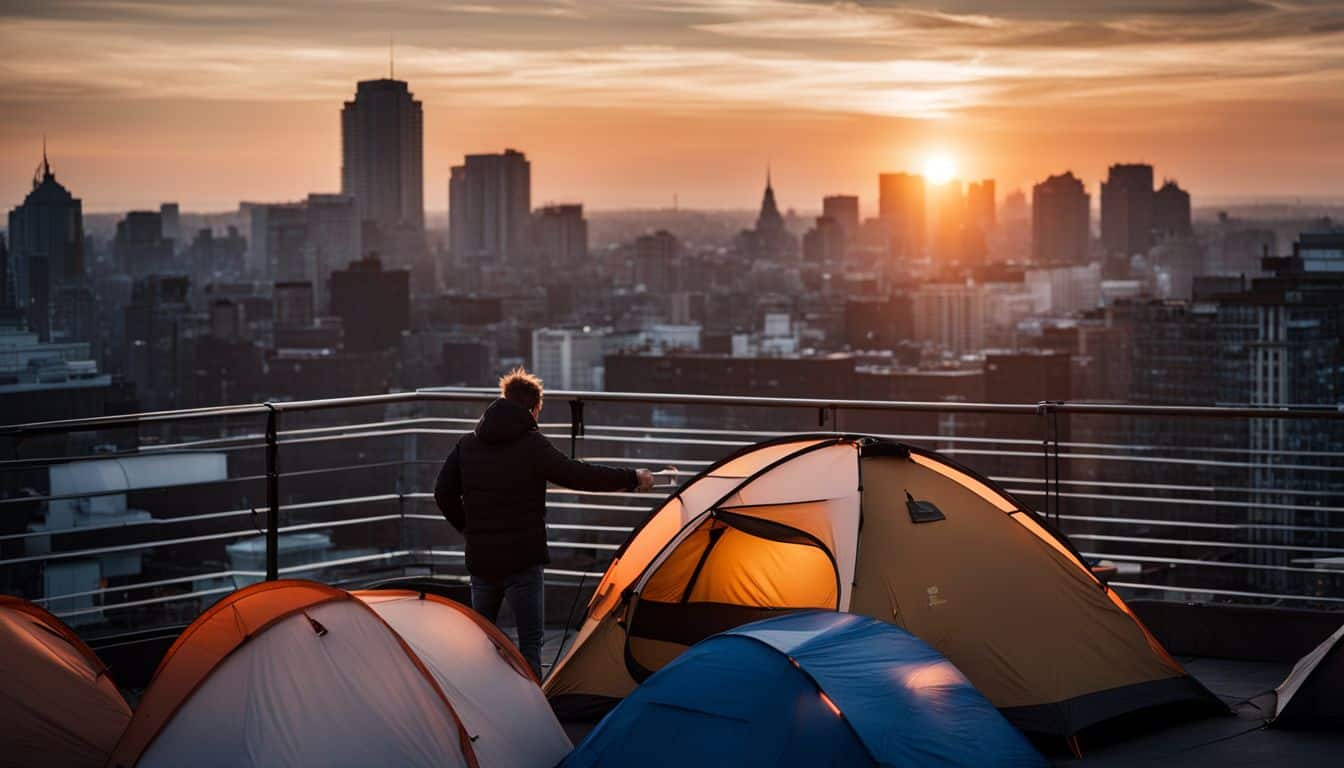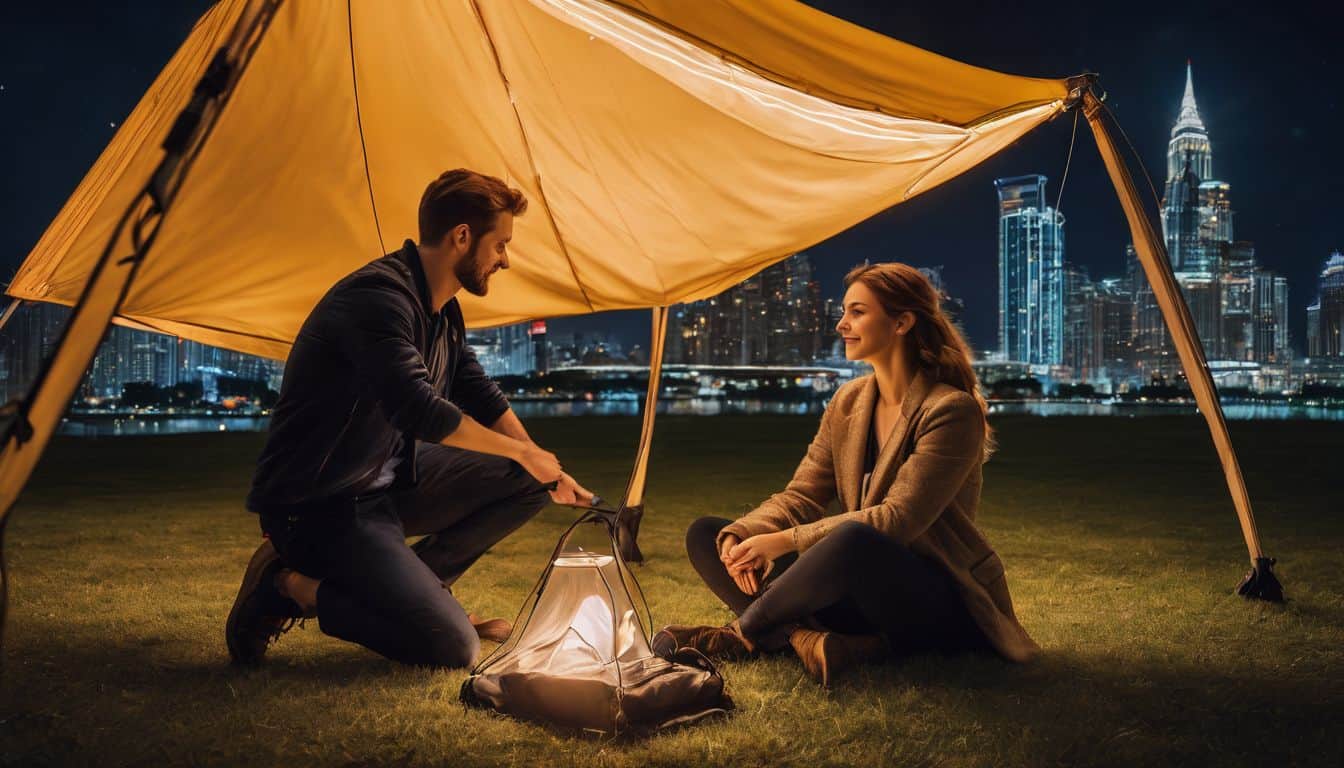Urban camping has emerged as a popular way for budget-conscious travelers and adventurers to explore cities without breaking the bank. While it may seem a far cry from forest camping and embracing nature, urban camping offers its own unique set of experiences and challenges.
Introduction
Urban camping involves finding creative ways to camp within city limits, often in unconventional locations. This practice has gained traction among travelers looking to maximize their exploration while minimizing costs.
Unlike traditional camping in natural settings, urban camping requires a different set of skills and considerations. It appeals to those who want to experience the pulse of city life while maintaining the adventurous spirit of camping. Urban campers often use vehicles, such as vans or small RVs, but some also employ stealth tenting techniques in urban green spaces.
Benefits of Urban Camping
Urban camping provides a cost-effective way to experience cities, offering unique perspectives on urban environments and allowing for flexible, spontaneous travel plans. By eliminating accommodation costs, travelers can extend their trips or allocate more budget to experiences and attractions.
This form of camping also allows for a more immersive urban experience, as campers often find themselves in neighborhoods off the typical tourist path. The flexibility of urban camping means travelers can easily change their plans, staying longer in places they enjoy or moving on quickly from less appealing locations without the constraints of hotel bookings.
Finding Urban Camping Spots
Some popular urban camping locations include:
- Legal street parking: Many cities have areas where overnight parking is permitted. Research local regulations and look for quiet residential streets or industrial areas.
- Hotel and big-box store parking lots: Some establishments allow overnight parking, especially for RVs or vans. Always ask for permission when possible.
- 24-hour businesses like gyms and laundromats: These can provide access to facilities and a sense of security due to constant activity.
- Parks and public spaces (where permitted): Some urban parks allow camping, but be sure to check local rules and obtain any necessary permits.
- Residential areas (with caution): While not ideal, some urban campers park in residential areas. This requires extreme discretion and respect for local residents.
When choosing a spot, prioritize safety, legality, and minimal impact on the local community. Always have a backup plan in case your chosen location doesn’t work out.

Stealth Camping Techniques
Successful urban camping often requires stealth. This includes arriving late and leaving early, blending in with surroundings, minimizing visibility and noise, and using appropriate gear for urban environments. Use window coverings in your vehicle to maintain privacy and reduce light emission.
Keep movements quiet and minimal once settled. Choose neutral-colored gear that doesn’t attract attention. Practice setting up and breaking down your camp quickly and efficiently to reduce the time you’re visible.
Safety Considerations
Safety is paramount when urban camping. Choose secure locations, be aware of local laws, trust your instincts, and always be prepared for emergencies. Research areas beforehand and avoid high-crime zones. Keep valuables out of sight and use security devices like steering wheel locks.
Have a plan for quickly leaving if you feel unsafe. Familiarize yourself with local emergency services and keep a charged phone handy.
Essential Gear for Urban Camping
Urban camping gear differs from traditional camping equipment. Focus on compact, discreet sleeping setups, portable cooking equipment, personal hygiene solutions, and security devices. A low-profile sleeping bag or blanket, inflatable sleeping pad, and compact pillow are essential.
Consider a small, quiet camping stove for cooking. Bring a portable power bank for charging devices. Don’t forget basic hygiene items like wet wipes and hand sanitizer.
Etiquette and Responsible Urban Camping
Practice Leave No Trace principles, respect local communities and businesses, and manage waste and sanitation responsibly. Always leave your camping spot cleaner than you found it.
Be quiet and unobtrusive, especially in residential areas. Use public restrooms or carry a portable toilet solution. Support local businesses when possible to maintain a positive relationship with the community.
Alternative Urban Accommodation Options
While urban camping can be an adventure, also consider alternatives like hostels, couchsurfing, or short-term rentals for a change of pace. These options can provide a break from camping, offer opportunities to meet locals and other travelers, and allow access to amenities like showers and laundry facilities. They can also be good fallback options if urban camping becomes challenging in a particular location.
Exploring Cities While Urban Camping
Make the most of your urban camping experience by utilizing public transportation, finding free attractions, and engaging with local communities. Many cities offer free walking tours, museum days, or outdoor concerts.
Use bike-sharing programs or public transit to explore efficiently. Engage with locals at markets, parks, or community events to gain authentic insights into the city’s culture.
Conclusion
Urban camping offers an exciting way to explore cities on a budget. While it comes with its own set of challenges, it can provide unforgettable experiences and a fresh perspective on urban environments. Remember to always camp responsibly and respect the communities you’re visiting.
Urban camping is just one of many types of camping for beginners to explore. For those seeking a different kind of adventure, consider island camping for a unique outdoor experience.

Leave a Reply